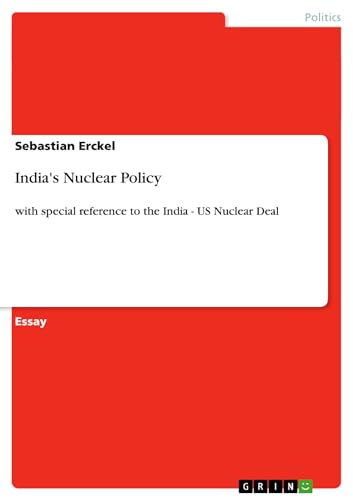India's Nuclear Policy: with special reference to the India - US Nuclear Deal - Softcover

"synopsis" may belong to another edition of this title.
- PublisherGRIN Publishing
- Publication date2009
- ISBN 10 3640327365
- ISBN 13 9783640327362
- BindingPaperback
- Number of pages40
Buy New
Learn more about this copy
Shipping:
US$ 24.74
From Germany to U.S.A.
Top Search Results from the AbeBooks Marketplace
India's Nuclear Policy
Book Description Taschenbuch. Condition: Neu. This item is printed on demand - it takes 3-4 days longer - Neuware -Essay from the year 2008 in the subject Politics - International Politics - Region: South Asia, grade: 80%= good, University of Kerala (Department of Political Science), course: India's Foreign Policy, language: English, abstract: This essay presents an outline of the evolution of India's Nuclear Policy with a special reference to the India- US Nuclear Deal.However, more recent developments such as the passing of the Deal, withdrawal of Left support and the vote of confidence in the Lok Sabha are not included. On April 8th 2008 The Hindu published an article titled 'Potential consequences of a regionalnuclear conflict' in which the author convincingly illustrates the dangers a nuclear- armedSouth Asia presents.1 The fact that both India and Pakistan, but of course also China,possess nuclear weapons has been an alarming reality since 1998. The relative progressthat has been achieved in India- Pakistan relations should not lead one to forget that twoconflicts in 1999 and 2001 could easily have escalated into a nuclear confrontation.India had embarked upon a civilian nuclear program right after her independence but the'weapon option' has always been present. India's nuclear policy has been an evolutionary,sometimes painful process equally shaped by domestic and international factors. This paperattempts to analyse some of these factors and argues that the development of nuclearweapons was a logical, albeit not planned, consequence of them. It is interesting that eventhose in India fiercely opposed to nuclear weapons subconsciously seemed to have realisedthat India's nuclear program could not be limited to civilian application forever.A constant in India's nuclear policy is the strong wish to become and remain as independentas possible. For this independent nuclear policy India had to pay a high price. Isolated frominternational nuclear cooperation, confronted with sharp criticism and even sanctions, Indiahad to rely on herself. While India's success has been a great source of national pride India'sisolation in nuclear issues also contributed to a lack of strategic planning regarding India'splace in both the region and the world, and the role the nuclear weapons should or shouldnot play in this. The (possible) India- US nuclear deal has provoked an intense debateamong Indian actors that creates the chance that India will finally come to terms with itsnuclear potential as she prepares for assuming the status of a world power. 20 pp. Englisch. Seller Inventory # 9783640327362
India's Nuclear Policy : with special reference to the India - US Nuclear Deal
Book Description Taschenbuch. Condition: Neu. Druck auf Anfrage Neuware - Printed after ordering - Essay from the year 2008 in the subject Politics - International Politics - Region: South Asia, grade: 80%= good, University of Kerala (Department of Political Science), course: India's Foreign Policy, language: English, abstract: This essay presents an outline of the evolution of India's Nuclear Policy with a special reference to the India- US Nuclear Deal.However, more recent developments such as the passing of the Deal, withdrawal of Left support and the vote of confidence in the Lok Sabha are not included. On April 8th 2008 The Hindu published an article titled 'Potential consequences of a regionalnuclear conflict' in which the author convincingly illustrates the dangers a nuclear- armedSouth Asia presents.1 The fact that both India and Pakistan, but of course also China,possess nuclear weapons has been an alarming reality since 1998. The relative progressthat has been achieved in India- Pakistan relations should not lead one to forget that twoconflicts in 1999 and 2001 could easily have escalated into a nuclear confrontation.India had embarked upon a civilian nuclear program right after her independence but the'weapon option' has always been present. India's nuclear policy has been an evolutionary,sometimes painful process equally shaped by domestic and international factors. This paperattempts to analyse some of these factors and argues that the development of nuclearweapons was a logical, albeit not planned, consequence of them. It is interesting that eventhose in India fiercely opposed to nuclear weapons subconsciously seemed to have realisedthat India's nuclear program could not be limited to civilian application forever.A constant in India's nuclear policy is the strong wish to become and remain as independentas possible. For this independent nuclear policy India had to pay a high price. Isolated frominternational nuclear cooperation, confronted with sharp criticism and even sanctions, Indiahad to rely on herself. While India's success has been a great source of national pride India'sisolation in nuclear issues also contributed to a lack of strategic planning regarding India'splace in both the region and the world, and the role the nuclear weapons should or shouldnot play in this. The (possible) India- US nuclear deal has provoked an intense debateamong Indian actors that creates the chance that India will finally come to terms with itsnuclear potential as she prepares for assuming the status of a world power. Seller Inventory # 9783640327362

